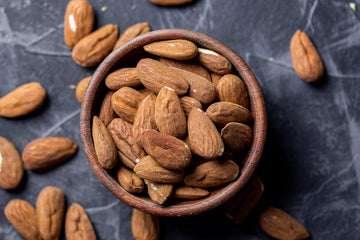Are almonds as healthy as they're said to be? Should you even eat them?
There are very few people in the world who have never encountered almonds. Almonds are very popular today and can be found in various cultures, foods and products.
They contain a large amount of healthy nutrients and fats, vitamins and fiber, and have proven positive effects on our health.
However, perhaps not everyone knows that excessive consumption of almonds (and anything else, really) can also have negative effects. Not only on our health, but also on nature.
What exactly are almonds and what are their benefits?
Although almonds are considered nuts, they are actually the seeds of the trees of the same name.
Almonds originate from Iran and surrounding countries, where they have been cultivated for several thousand years BC. The first mentions of almonds appeared in what is now Jordan around 3000-2000 BC. In addition, almonds were also discovered in the sarcophagus of the Egyptian pharaoh Tutankhamun, who lived in 1325 BC.
Since then, almonds have spread from the Mediterranean region to California, where today about 60% of the world's production is grown.
100g of almonds contains 637 kcal, 53g of fat, 18g of carbohydrates, of which 4g are sugars, 12g of fiber, and 20g of protein.
In addition, almonds are literally packed with vitamins and antioxidants.
Proven positive effects include, for example, reducing weight and cholesterol, reducing the risk of certain types of cancer and cardiovascular diseases, or maintaining good blood sugar levels.

How can almonds harm you?
There is a lot of information circulating in the world today that almonds are one of the healthiest nuts ever. However, as with everything in life, excessive consumption of almonds has its negative effects.
They can cause digestive problems: Since almonds contain a lot of fiber (more precisely, there are 12g of fiber in 100g of almonds), their excessive consumption can cause constipation. Therefore, it is recommended to drink more water when consuming almonds. In addition, other side effects include diarrhea, bloating, or stomach pain.
They reduce the absorption of good nutrients : the high amount of fiber that almonds contain can result in a reduction in the absorption of calcium, magnesium, manganese and iron in the body. Therefore, to avoid such problems, consume almonds between meals, as a snack or an afternoon snack. The maximum recommended daily dose is around 30g of almonds per day.
They increase weight : although almonds are among the nuts that can help you lose weight, their excessive consumption (more than 20 almonds above the maximum daily dose) will guarantee you the exact opposite. The weight gain effect is mainly caused by the excessive amount of calories, as well as reduced physical activity.
They can cause various allergies : almonds are the third most common nut with the highest number of allergic reactions, after walnuts and cashews. Most of these allergies are caused mainly by amandin, which is found in almonds and was recently added to the list of allergens.
Almonds and their negative impact on nature.
You might be wondering how growing nuts can negatively impact nature. However, the truth is that almonds are one of the biggest "pests".
It takes 4.2 liters of water to grow one almond . Considering that almonds grow mainly in dry areas where there is a lack of clean water, the negative impact on nature is automatic.
Take California in the United States as an example. California is one of the largest almond growers in the world, with an annual production of around 1 million tons. The area where almonds are grown today is 44% larger than it was 10 years ago. In addition, the water needed to grow them is being taken from local lakes and rivers. This negatively affects, for example, the farming of king salmon, which simply has nowhere to live.
This change has resulted in one more thing, and that is high prices, whether for almonds or the aforementioned king salmon, the farming of which is also growing.
Meanwhile, in England, almond and almond milk sales have increased by 79% in recent years, and the price of salmon has doubled. All of this has pushed world prices even higher. And to stay in the market, American companies are planting and growing even more almonds than before. As a result, they need even more space and water.
And to make matters worse, almond farming in California has another very negative impact on nature. In order for almond trees to produce almonds, they need bees to pollinate them.
To be more precise, it takes 1.4 million bees to pollinate all the almonds in California. And since California is not a beekeeping region, entire bee colonies are imported from other US states.
Even that wouldn't be such a problem if all those bees returned to where they came from. However, for example, in 2014, all the bees that were brought there died after contact with pesticides.
And where do our almonds come from?
Based on this information, we decided to do things differently. Instead of getting almonds from unverified sources, we set out to find someone who would grow almonds for us according to our expectations.
After several weeks of searching and testing, we found one. His name is Konstantinos and he comes from Greece. Konstantinos' almonds immediately became a hit with our customers and were also appreciated by the jury at the Great Taste Awards gastronomic competition (note: our almonds received 1 gold star at the Great Taste Awards 2020).
Our almonds are much tastier and of higher quality than, for example, American or Spanish ones.
And that's also thanks to Konstantin, who always has only the freshest and highest quality almonds saved for us.
Last but not least, our almonds and the products we make from them are delicious thanks to the special roasting technique we use.
So what now? So should you eat almonds or not?
The answer to this question is clear - if you are not allergic to them, then definitely yes .
Almonds are actually among the healthiest things we have. The content of healthy nutrients in almonds is high and they have very positive effects on our health and metabolism.
Add almonds to your diet every few days. Feel free to swap out regular milk for almond milk, and be sure to try almond butter.
However, when consuming them, keep in mind that you should not overdo it.






